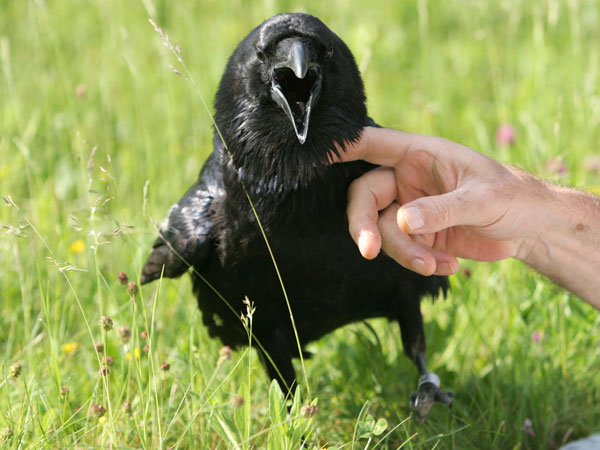Last Updated on November 14, 2023 by Fumipets
It’s difficult for animal enthusiasts to resist the allure of keeping almost any kind of animal as a pet. Of course, the list gets elevated to the top to include clever creatures like crows. Many individuals even become friends with the crows that roost nearby or at the neighborhood park.
It seems sensible to assume a crow would make a fantastic pet because they make terrific “friends” in this way, right? It goes without saying that reality and our aspirations don’t always match. So, are crows suitable as pets? These seven factors must be understood before you decide to keep a crow as a pet.
Are Crows Good Pets?
Ever come across someone who had a pet crow? If you said “yes,” it is undoubtedly unexpected. Crows may be seen all around the globe swooping through the air, roosting adjacent houses, or even foraging for food in parks. But there are numerous reasons why you’ve probably never seen a crow in captivity.
The inescapable truth is that crows are never suitable as pets. They just aren’t designed for life in captivity. Crows need a lot of space to wander about because they are too sophisticated to be locked up. A crow’s life expectancy is substantially shorter in captivity than it is in the wild. When you try to keep a crow as a pet, difficulties might occur that go beyond simply their physical health and several mental issues.

The 7 Things You Must Know About Crows as Pets
1. Crows are Wild Animals
Crows cannot be tamed, therefore if you want to keep one as a pet, you’ll need to catch it in the wild. This leads to a clear moral conundrum. Consider it in this manner. Would you want someone to kidnap you from your unrestricted existence outside of a cage and confine you inside for the rest of your days? Most likely not. A crow’s situation is actually not that different. In the wild, they have unrestricted access to the whole universe and the sky, something you can never provide them in your house. Removing a crow from its natural habitat is harsh, and confining it in a cage is much worse.
2. They Need to Sunbathe
It turns out that crows like sunbathing for more than simply pleasure. Crows need vitamin D just as people do, and the best method for them to receive it is by absorbing it while sunbathing. Granted, you could place a crow’s cage near a window so it still receives sunshine, but that wouldn’t be the same, and your crow would likely end up lacking vitamin D, which might lead to health issues.
3. It’s Illegal in Many Countries
Crows travel great distances. The Migrating Bird Treaty Act protects them in America and makes it unlawful to catch, kill, trade, sell, or transport any migratory bird, including crows. There are, however, a select few exceptions that must be approved by the U.S. Fish and Wildlife Service, and you will almost probably not be permitted to have a pet crow among them. This implies that trying to domesticate a crow is very unlawful and is punishable by felony federal charges that might land you in jail and cost you a lot of money!
4. Crows are Social Birds
Imagine being taken from your family and being imprisoned in seclusion till you passed away. Due to your extreme loneliness, you would probably surely have mental health issues. Like humans, crows are highly sociable animals. A crow’s fate will be one of loneliness and misery if its family is taken away from it.
5. They Go Crazy in Captivity
Crows are very clever animals. Both their bodies and brains need to be exercised. It’s been said that trying to maintain a crow is like trying to raise an eternal toddler. But with a crow, it’s worse since the crow will experience negative mental health impacts if it isn’t given the chance to apply its brains, reason through issues, and solve problems. Crows that are held in captivity have many psychological problems, including being mad and becoming insane.
6. You’d Need to Provide a Massive Cage
Crows are undoubtedly birds, and birds fly. Being stranded on the ground or on a perch without any means of taking flight is harmful for crows. Your crow would need to fly for at least a few hours each day, which would call for an absolutely enormous cage! To maintain a single crow, you’d need an aviary, but few people have that much room available, not to mention the cost of installing one.
7. Medical Care is Near Impossible
A crow will eventually require medical attention, and because owning one is strictly prohibited, you won’t be able to provide it. Because they will have to inform the police about you and your crow, veterinarians won’t be much help to you. Therefore, you will be responsible for handling all of your crow’s medical issues. How well-versed are you in avian health? Probably not enough to care for a pet crow for the whole of its life without the assistance of a specialist.

What if You Find an Injured or Abandoned Crow?
We’ve established that it’s a bad idea to keep a crow as a pet. But what if you come upon a crow that is hurt or abandoned and needs assistance? Then, is it okay to bring the crow inside and take care of it? Without a doubt. If you try to assist the crow, it could imprint with you, which would imply that it would see you as a parent, which would place it at a disadvantage for the rest of its life. For this reason, while dealing with newborn crows, wildlife specialists cover their faces. Crows that imprint with humans may start to see people as resources and may approach them randomly, which might be hazardous for the crow.
Even if you come across a wounded crow, you shouldn’t approach, handle, or keep it. Call Wildlife Protective Services instead. They are experts at handling situations just like this, therefore they will be far more prepared to manage it than you are. Additionally, you’ll be sparing yourself a federal probe that would undoubtedly ensue from taking the crow, which, as you may recall, is quite forbidden.
What to Do Instead of Keeping Crows for Pets
We’ve crushed your dreams of having a pet crow since we know how much you adore them. What is a lover of crows to do at this point? Don’t worry; you still have alternatives. In reality, depending on how much time you want to devote to crow connections and care, you have three excellent options.
1. Befriend Your Local Crows
Crows are said to be highly sociable and friendly animals. It’s quite usual for local residents to become friends with whole crow flocks. Over time, you may start to establish trust with the animals by providing them with nutritious meals like peanuts, dry pet food, and more. The crows must be fed often, and you must confirm that doing so is permitted where you live, but given enough time, they will come to know and trust you, and a relationship may develop.
2. Volunteer with Wildlife Protection Services
Most significant jurisdictions have a base for their wildlife protection services. They are in charge of taking care of wild creatures that need assistance. You will get the opportunity to work with animals that they are working to save if you volunteer with your local chapter. Although you won’t always have the opportunity to work with crows, you’ll be in a fantastic position to do so when they do.
3. Become an Accredited Wildlife Rehabilitator
You might train to become a certified wildlife rehabilitator if you desire a more serious method to become engaged with crows and other animals. If you wanted to, you could even focus only on working with crows. It will take a lot of effort and sacrifice to go this route, but if you’re intent on getting near crows, it’s definitely the best course of action.
Conclusion
Crows are social, highly clever birds that many people find endearing. Crows, though, are awful pets for a number of reasons. You and the crow are in a dangerous predicament. A crow kept as a pet will go insane while being confined, separated from their friends and family, and deprived of the room, exercise, and mental stimulation that are essential for their well-being.
Additionally, if you keep animals unlawfully, you might be charged with a federal criminal. It’s better to just become friends with your neighborhood crows at the park or choose a profession that enables you to help them. However, under no circumstances should you try to catch a crow and keep it as a pet. There may be serious repercussions.


















